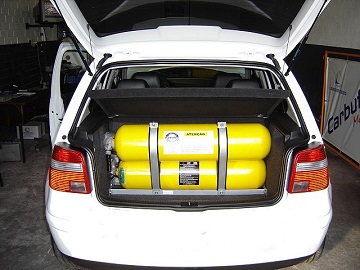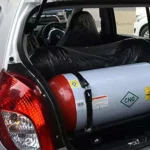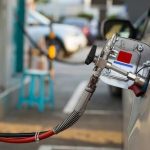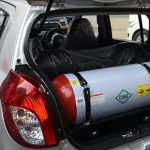The Federal Government, through its Presidential Compressed Natural Gas Initiative (PCNGi), is offering Lagos residents an opportunity to convert their vehicles from petrol to Compressed Natural Gas (CNG) for free. This initiative is set to take place on Friday, September 13, from 3 PM to 6 PM, across six designated locations in Lagos, as part of “Operation First Come, First Serve.”
The first 50 vehicles that pass the inspection process at each of the six locations will receive free CNG conversion kits. This conversion will enable vehicle owners to refuel at a much cheaper rate—N230 per SCM of CNG—compared to petrol at any NIPCO station, providing significant savings.
Key Details of the Conversion Drive:
The announcement was made by Lagos State Commissioner for Transportation, Oluwaseun Osiyemi, via his official X (formerly Twitter) account on Thursday. Osiyemi encouraged Lagos residents to take full advantage of the offer, noting that the CNG conversion is a one-time opportunity for immediate financial relief amid rising petrol prices.
The PCNGi is part of the Nigerian government’s broader effort to promote cleaner energy alternatives, ease the economic burden caused by the skyrocketing fuel prices, and encourage the use of more eco-friendly transportation options nationwide. With CNG being far less expensive than petrol, vehicle owners can expect to experience immediate savings post-conversion.
Lagos CNG Conversion Centres
Here is a list of the six designated CNG conversion centers in Lagos, along with their addresses:
- Femadec- Km 42, Lekki-Epe Expressway, Majek Second Gate Stop, Abiju Ibeju, Lekki, Lagos.
- Portland – No. 1, Ojota Interchange Terminal, Bayo Shodipo, Ojota, Lagos.
- Mezovest– KM 23, Lekki-Epe Expressway, Ajah, opposite Kilimanjaro, beside Libmat Motors, by Abraham Adesanya Bus Stop.
- Dana Motors– Dana Motors Ltd Kia Plaza, 117 Oshodi-Apapa Expressway, Isolo, Lagos.
- MBH Power – Km 5, Ikotun Road, Itamope, Ikorodu, Lagos.
- Autogig – Plot 144b Gbagada Expressway, Gbagada, Lagos.
CNG Conversion Expanding Beyond Lagos
In addition to the Lagos exercise, the “Operation First Come, First Serve” initiative will be extended to four other major cities between Friday and Saturday. On September 13, CNG conversion activities will also occur in Abeokuta, Ogun State, and Ibadan, Oyo State, from 3 PM to 6 PM. The following Saturday, September 14, similar free conversion exercises will occur in Abuja and Kaduna, from 3 PM to 6 PM. Like in Lagos, only the first 50 vehicles that pass inspection at the designated centers will qualify for the free CNG kits.
Background on the Presidential Compressed Natural Gas Initiative (PCNGi)
The PCNGi was officially launched in August 2023 by President Bola Ahmed Tinubu, to transform Nigeria’s transportation sector through the widespread adoption of CNG. The initiative aims to reduce the country’s dependency on petrol, stimulate local manufacturing, and create employment opportunities while fostering technical skill development in the energy sector.
Under this initiative, the government plans to introduce over 11,500 CNG-enabled vehicles and distribute 55,000 conversion kits for petrol vehicles across the country. The initiative also includes establishing a nationwide network of workshops to provide easy access to CNG conversion services and supporting the transition to CNG buses for mass transit systems.
The government is working closely with the private sector to finance CNG bus conversions and encourage investment in CNG refueling infrastructure. By June 2024, twelve new CNG stations were inaugurated in Lagos and Abuja in partnership with NNPC and NIPCO Gas, further expanding the accessibility of CNG refueling.
Additionally, in July 2024, the PCNGi signed a Memorandum of Understanding (MoU) to convert one million commercial vehicles to CNG by 2027. As part of this agreement, 2,000 workshops were identified across the country to facilitate the project.
What This Means for MSMEs in Africa
For micro, small, and medium enterprises (MSMEs) in Africa, particularly in Nigeria, this initiative could be transformative. Businesses that rely heavily on transportation can save significantly on fuel costs by converting their fleets to CNG. With petrol prices continuing to rise, CNG offers a more stable and affordable fuel alternative. The initiative could also foster new opportunities for MSMEs involved in the energy, transportation, and auto repair sectors, as the demand for CNG conversion services and related technologies grows.
This push towards cleaner energy sources not only helps to stabilize the operating costs of businesses but also contributes to a more sustainable economy, positioning Nigeria—and Africa as a whole—as a leader in the transition to eco-friendly energy solutions.
For businesses and residents alike, the free vehicle conversion initiative is an opportunity to embrace a greener, more affordable future in transportation.










